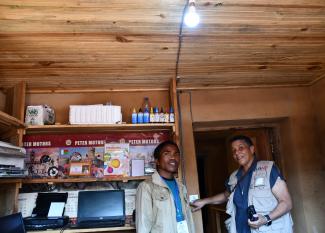TSARAZAZA – The U.S. government, through Power Africa and the U.S. Agency for International Development (USAID), celebrated the completion of a three-year project with Hydro Ingénierie Etudes and Réalisations (HIER).
The project will bring electric energy to 1,500 rural households in Tsarazaza and Fandriana communes. By the end of the year, Power Africa and private sector partners will energize more than 3,600 households and businesses in Madagascar.
These new connections will provide households and businesses with electricity for the first time - facilitating economic development activities such as welding, refrigeration of food at restaurants, and improved carpentry. Children and teachers alike can now study and prepare for courses in the evening; local government buildings can utilize computers, printers and other technology; and communities have improved security at night.
U.S. Ambassador to Madagascar and the Comoros Claire A. Pierangelo participated in a site visit to Tsarazaza to celebrate the electrification of the commune and to meet with local officials and community members to discuss the completion of the project and future energy needs.
During brief remarks, Ambassador Pierangelo asserted, “Even though this project is coming to an end, we will continue to support the deployment of clean energy in Madagascar. The U.S. government will continue to seek out opportunities through our Power Africa colleagues and partnerships with the local private sector to bring clean, renewable energy to rural areas.”
The U.S. government’s Power Africa program convenes the collective resources from the private sector, international development organizations, and governments in Africa to increase access to energy. Since 2018, Power Africa has contributed to nearly 90,000 new connections through $2.2 million in support to energy developers in Madagascar.
The United States stands side by side with Madagascar to safeguard the country’s natural resources. Since 2013, USAID has committed nearly $80 million in programs that promote sustainability, improve livelihoods for local communities, bolster governance of natural resources, diminish international wildlife trafficking, and protect thousands of hectares from illegal exploitation.

U.S. Embassy in Madagascar/Mamy Rabesahala
